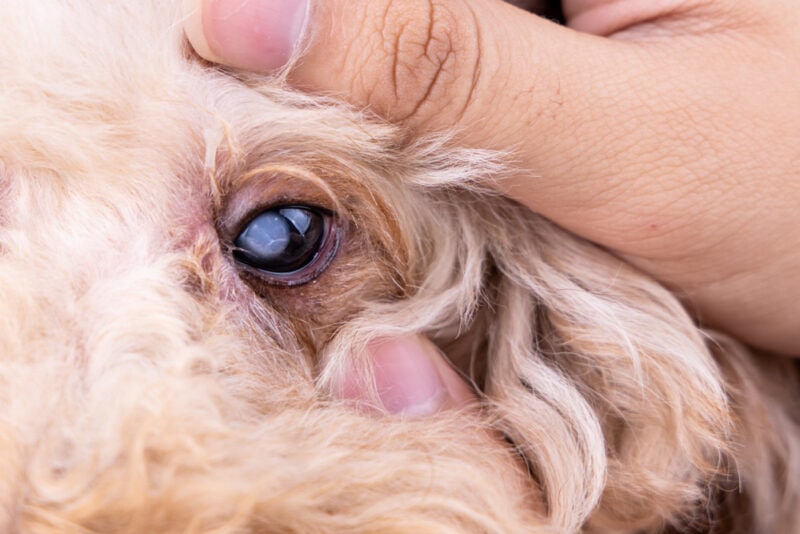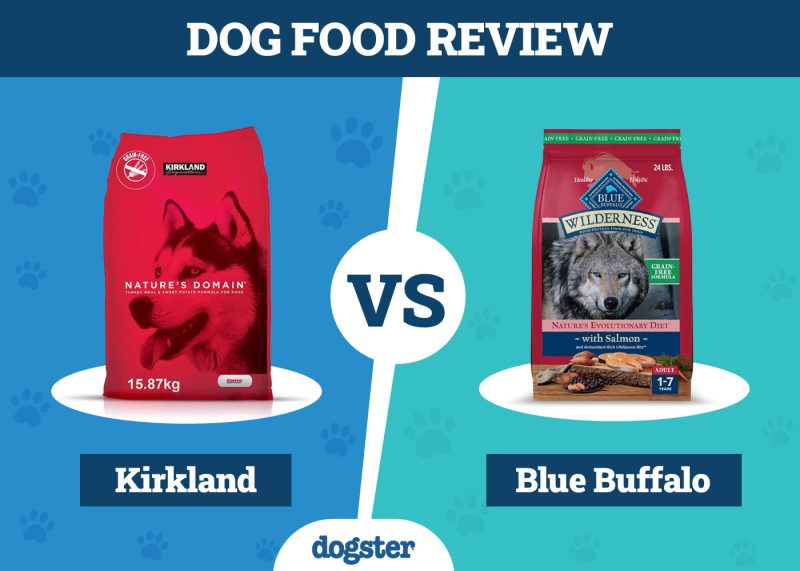Toy Poodles are among the most popular dog breeds in the world and are especially well-suited to small-space living. Unfortunately, the breed’s popularity has led to a rise in opportunistic breeders who are not as concerned with health problems. If you’re considering welcoming one of these pups into your home, here are nine Toy Poodle health problems you need to know.

The 9 Most Common Health Problems in Toy Poodles
1. Luxating Patella
| Type of health problem | Bone and joint |
| How it’s treated | Surgery, medications |
Luxating patellas1, or loose kneecaps, are a common problem in many small and toy breed dogs, including the Toy Poodle. In this condition, the dog’s kneecap slips out of place periodically because of an issue with the anatomy of the knee joint. You may notice your Toy Poodle hop or skip while walking and sometimes limp on the affected hind limb(s).
Luxating patellas can range from mild to severe, and treatment usually depends on how bad the issue is. Some dogs require surgery, while others can be managed with medications and joint supplements. This condition puts a dog at higher risk of developing arthritis or an additional knee injury. Luxating patella is an inherited condition, and before buying a Toy Poodle puppy, ask the breeder if there is a family history of bad knees.
To reduce the severity, development, and signs of luxating patella, keep your Toy Poodle at a healthy weight to reduce strain on their joints. Opt for low-impact exercises, such as swimming or gentle walks, that will help strengthen the muscles around the knee. You can also ask your vet about joint supplements containing glucosamine and chondroitin that may provide support, in addition to a balanced diet rich in omega-3 fatty acids that can support joint health. Providing soft surfaces for play and limiting excessive jumping can also help prevent injuries.

2. Epilepsy
| Type of health problem | Nervous system/brain |
| How it’s treated | Medication |
Epilepsy is an inherited seizure disorder. Several breeds are especially prone to the condition, including Toy Poodles. Seizures can occur for many reasons, including low blood sugar or brain disease. When they happen without an apparent cause, the dog is generally diagnosed with primary or idiopathic epilepsy, which has a genetic basis.
Ask your Toy Poodle breeder whether there is a family history of seizures before you buy a puppy. These attacks generally don’t start until a dog is 1–5 years old. If your Toy Poodle is diagnosed with epilepsy, they will likely need to be on lifelong medication to control the frequency and severity of seizure episodes.
Although epilepsy cannot be entirely prevented, reducing stress and maintaining a consistent daily routine can help minimize triggers. Feeding your Toy Poodle a high-quality diet free of artificial additives and allergens can also support brain health. Some pet owners find that adding medium-chain triglycerides from coconut oil to their dog’s diet may help with seizure control, but it’s important to consult with your vet before adding new foods to their diet.
- See Also: Best Dog Insurance Companies
3. Bladder Stones
| Type of health problem | Urinary |
| How it’s treated | Surgery, medications, diet change |
Toy Poodles are one of several breeds especially prone to developing bladder and kidney stones. The stones are made up of minerals, such as magnesium and calcium. Crystals of these minerals are often present in the Toy Poodle’s urine, especially after infection. The crystals may begin to stick together, forming stones.
The stones can cause further infection, pain when your dog pees, bloody urine, and even kidney damage. In some cases, your Toy Poodle may attempt to pee out a stone, only to have it get stuck, preventing them from peeing normally.
Depending on the stones’ size, location, and mineral makeup, your vet may attempt to dissolve them through diet changes and medications. In many cases, your Toy Poodle will need surgery to remove the stones.
To prevent bladder stones, encourage your Toy Poodle to drink plenty of fresh water and provide a moisture-rich diet, such as wet food or fresh food diets. Ask your vet for a balanced diet recommendation that limits excessive amounts of minerals like calcium, magnesium, and phosphorus. Some claim that cranberry supplements or herbal urinary support blends may help maintain urinary tract health. Regular vet check-ups and urine tests can catch early signs of bladder stone development.

4. Cushing’s Disease
| Type of health problem | Endocrine |
| How it’s treated | Medications |
Cushing’s disease is a common problem in dogs, but Toy Poodles are especially prone to developing it. Cushing’s disease causes the dog’s adrenal glands to stop functioning properly, causing them to overproduce various hormones. It can take a long time to notice symptoms, but early signs include drinking, urinating, and eating more than usual.
Your Toy Poodle may also seem less active and eventually begin losing its hair. Cushing’s disease is easily diagnosed with a blood test. If your Toy Poodle develops Cushing’s disease, they generally need lifelong medication to manage it.
While Cushing’s disease cannot be prevented, maintaining your Toy Poodle’s overall health with regular veterinary checkups can support early detection and management. A balanced, anti-inflammatory diet and healthy weight maintenance will help support organ function, though they do not prevent the hormonal imbalance caused by pituitary or adrenal tumors. Natural supplements like milk thistle or turmeric may support liver health, but they should only be used under veterinary guidance due to limited clinical evidence.
5. Cataracts
| Type of health problem | Eye |
| How it’s treated | Eye drops, surgery |
Toy Poodles are prone to several eye problems, including cataracts. The lens of the dog’s eye gradually hardens and grows cloudy as proteins from the eye settle in that location. Cataracts can be an inherited condition or a secondary issue from another disease, such as diabetes.
Eventually, cataracts can cause your Toy Poodle to lose vision. Dogs don’t rely on their eyesight as much as people, and most can adjust to their blindness. Your vet may suggest eye drops to keep your dog comfortable and household adjustments to help your Toy Poodle navigate life without vision. Often, cataracts can be removed with surgery.
While cataracts in Toy Poodles are often inherited or related to conditions like diabetes and cannot be fully prevented, maintaining overall eye health through a balanced diet can be beneficial. This includes antioxidants like vitamins A, C, and E, as well as omega-3 fatty acids from fish oil. Regular veterinary checkups and early screenings are crucial for the early detection and management of eye issues.

6. Legg-Calve-Perthes Disease
| Type of health problem | Bone and joint |
| How it’s treated | Surgery, medication |
This unusual joint condition is most common in dogs under 20 pounds and is inherited in many breeds, including Toy Poodles. Legg-Calve-Perthes disease affects the dog’s hip joint. In this condition, the femoral head, or the portion of the Toy Poodle’s leg bone that sits in the hip joint, begins to deteriorate.
Eventually, it leads to lameness, pain, and arthritis. Signs of the disease appear early, with dogs as young as 3 months. Treatment involves pain management and possibly surgery in severe cases.
Ensuring your Toy Poodle maintains a healthy weight and gets regular exercise can help prevent unnecessary stress on their hip joints. A diet rich in collagen, omega-3s, and glucosamine can support bone and joint health. Avoid excessive jumping or rough play that could cause joint injuries.
7. Disc Disease
| Type of health problem | Nervous system/spine |
| How it’s treated | Rest, medication, surgery |
Toy Poodles are among the breeds especially prone to developing spinal disc disease. It occurs when one or more cushions between the dog’s spinal discs rupture or slip. Without the jelly-like structures’ protection, the spine’s bones can press on the dog’s spinal cord. Spinal disc disease can happen gradually or quickly due to sudden movement or activity. Treatment includes rest, pain medication, or surgery in severe cases.
To reduce the risk of disc disease, avoid allowing your Toy Poodle to jump from high places or perform excessive stair climbing. Strengthening their muscles through controlled exercise, like walking and swimming, can help support the spine. Providing an orthopedic dog bed can reduce strain on their back. A diet rich in omega-3s and anti-inflammatory foods may support spinal health, and maintaining a healthy weight reduces pressure on the spine, though they cannot prevent the genetic or degenerative causes of disc disease.

8. Diabetes
| Type of health problem | Endocrine |
| How it’s treated | Medication, diet change |
Diabetes is one of the most common diseases in dogs, as in humans, but Toy Poodles are among the breeds especially likely to develop the condition. Dogs with diabetes are unable to keep their blood sugar at appropriate levels. If left untreated, diabetes can quickly become life-threatening.
Early signs of diabetes include drinking and urinating excessively and weight loss. Diabetes is easily diagnosed by a simple blood sugar check and will require lifelong treatment. A Toy Poodle with diabetes usually needs daily insulin shots and a carefully-controlled, low-carbohydrate diet.
Preventing diabetes involves feeding your Toy Poodle a balanced, low-carb diet free from excessive sugars and processed foods. Regular exercise helps regulate blood sugar levels, and maintaining a healthy weight can reduce the risk of insulin resistance. Some claim that herbal supplements like cinnamon and fenugreek may help stabilize blood sugar levels, but always consult a vet before adding them to your dog’s diet. Regular blood sugar checks can help with early detection and management.
9. Von Willebrand’s Disease
| Type of health problem | Blood |
| How it’s treated | Extreme caution |
Von Willebrand’s disease is an inherited blood disorder that occurs in over 30 breeds, including the Toy Poodle. It’s most commonly associated with Doberman Pinschers because they make up most of the diagnosed cases. Dogs afflicted with the disease are missing a blood protein that helps blood form clots. Because of this, there exists the potential of uncontrolled bleeding. Before your Toy Poodle is spayed or neutered, your vet may suggest a blood clotting test for safety. There’s no treatment or cure for the disease. Owners of Toy Poodles with von Willebrand’s will need to be extra careful to avoid injury to their pups. In emergent cases of bleeding, blood transfusions can be performed.
Since Von Willebrand’s disease is genetic, the best prevention is responsible breeding. If your Toy Poodle has the condition, be extra cautious to prevent injuries that could lead to excessive bleeding. Keep their nails trimmed to avoid accidental bleeding and avoid rough play that could lead to cuts or bruises. Natural remedies like vitamin K-rich foods may help support blood clotting, but always consult your vet for the best management strategies.
Remember to have regular vet visits when owning a Toy Poodle to keep their health and well-being. If you’re concerned about your dog’s health we suggest you speak to a vet.
If you need to speak with a vet but can't get to one, head over to PangoVet. It's our online service where you can talk to a vet online and get the advice you need for your dog — all at an affordable price!

Conclusion
Because so many of the nine Toy Poodle health problems have an inherited and genetic basis, it’s essential that you take the time to research potential breeders thoroughly. Look for one who performs all recommended genetic and health screenings for their dogs. They should be open to any questions regarding the health history of the puppy you are considering.
Unfortunately, small breeds like the Toy Poodle are among the easiest for unethical puppy mill breeders to produce. No, you can’t avoid every medical problem in your Toy Poodle, but taking the extra steps to start with the healthiest puppy possible may save you a lot of money and heartbreak.
- Related Read: Best Dog Foods for Bladder Stones – Reviews & Top Picks
Featured Image Credit: NDAB Creativity, Shutterstock






















